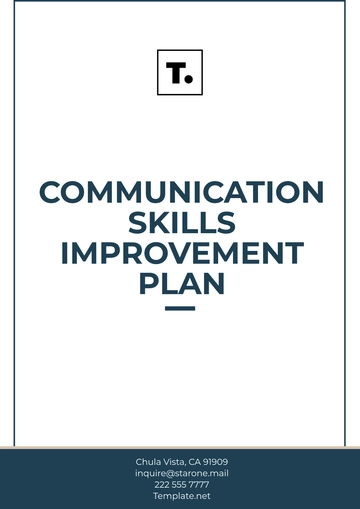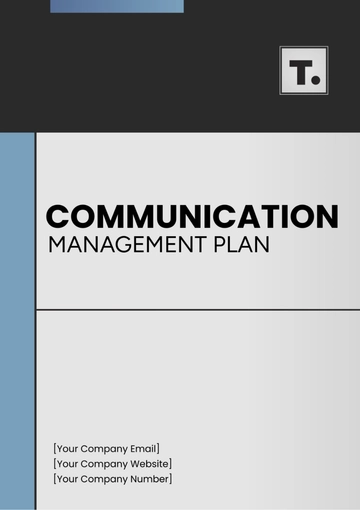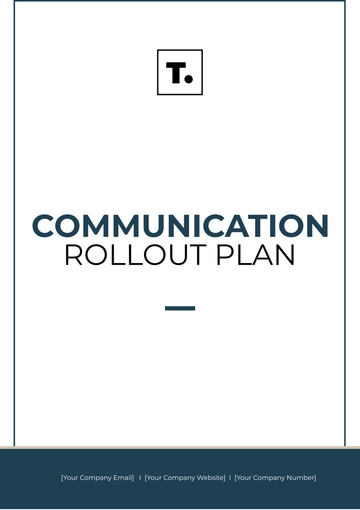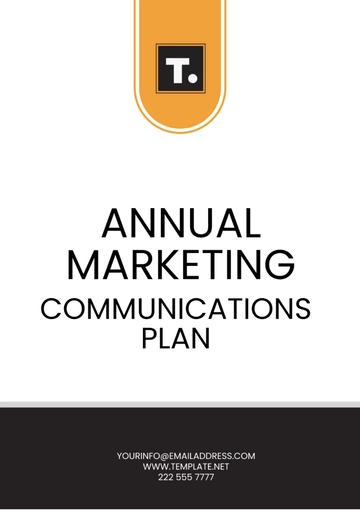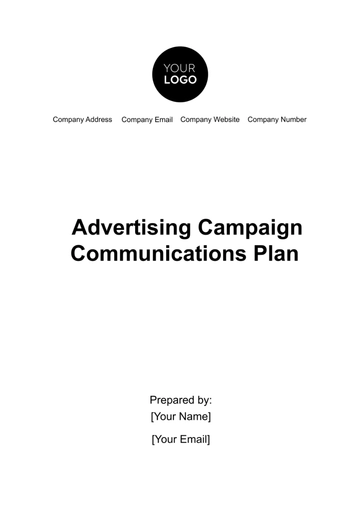Free Communication Skills Improvement Plan

Prepared by:
[YOUR NAME]
[YOUR COMPANY NAME]
1. Introduction
This Communication Skills Improvement Plan is designed to enhance communication abilities within a professional context, emphasizing both verbal and non-verbal skills. The plan aims to ensure clarity, effectiveness, and professionalism in all forms of communication, facilitating improved collaboration, understanding, and productivity in the workplace.
2. Objectives
The key objective of this plan is to improve communication skills that contribute to a more efficient, effective, and harmonious work environment. Specific goals include:
Enhancing Active Listening: Developing the ability to fully engage with speakers and demonstrate understanding through verbal and non-verbal feedback.
Refining Verbal Communication: Improving clarity, articulation, and the ability to tailor messages to different audiences.
Strengthening Written Communication: Focusing on grammar, structure, and conciseness to ensure professional and effective written correspondence.
Improving Non-Verbal Communication: Cultivating awareness of body language, tone, and other non-verbal cues to support verbal communication.
3. Assessment of Current Skills
3.1 Self-Assessment
Begin by conducting a self-assessment to evaluate current communication strengths and weaknesses. Reflect on recent communication encounters (both positive and negative) and identify areas where improvement is needed. This reflection can include thoughts on listening habits, clarity in speech, and the effectiveness of written communication.
3.2 Professional Feedback
Seek external feedback from peers, supervisors, or mentors to gain an objective perspective on your communication skills. Utilize surveys, structured interviews, or informal feedback sessions to gather insights on areas of strength and opportunities for growth. This feedback will provide a comprehensive understanding of your communication style.
4. Development Strategies
4.1 Active Listening
Active listening is a cornerstone of effective communication. Strategies to improve this skill include:
Maintaining Eye Contact: Demonstrates attentiveness and fosters trust.
Summarizing and Paraphrasing: Restate key points to confirm understanding.
Avoiding Interruptions: Allow the speaker to finish before responding, ensuring respect and full comprehension.
Asking Clarifying Questions: Demonstrate engagement by asking questions that deepen understanding.
4.2 Verbal Communication
Clear, concise, and articulate speech is essential in professional settings. To enhance verbal communication:
Practice Clarity: Focus on speaking clearly and at an appropriate pace.
Tailor Messages to the Audience: Consider the audience’s needs, knowledge, and expectations before speaking.
Engage in Public Speaking: Enroll in workshops or participate in group discussions to build confidence in delivering messages to larger audiences.
Participate in Feedback Sessions: Regularly seek feedback from peers or mentors on clarity and effectiveness.
4.3 Written Communication
Strong written communication is vital in conveying professionalism and attention to detail. To improve writing skills:
Focus on Grammar and Structure: Review basic grammar rules and structure, ensuring clarity and professionalism in all written materials.
Practice Conciseness: Focus on conveying key messages in a clear, direct manner without unnecessary elaboration.
Seek Peer Review: Regularly review and revise important emails or reports, seeking peer feedback to ensure clarity, tone, and style are appropriate.
4.4 Non-Verbal Communication
Non-verbal cues can enhance or undermine your message. To improve non-verbal communication:
Monitor Body Language: Be aware of posture, gestures, and facial expressions that may contradict or reinforce your spoken words.
Tone and Pitch: Ensure your tone matches the intent of your message, using pitch variation to emphasize key points.
Engage in Role-Playing: Practice delivering messages with intentional body language and facial expressions to reinforce verbal communication.
Participate in Non-Verbal Feedback Sessions: Get feedback from colleagues on your non-verbal cues during interactions.
5. Action Plan
Action Item | Target Date | Resources | Evaluation Method |
|---|---|---|---|
Enroll in Communication Workshop | Month 1 | Workshop Provider | Instructor Feedback and Certificate |
Implement Weekly Practice Sessions | Ongoing | Peer Group | Peer Feedback |
Complete Online Public Speaking Course | Month 2 | Online Course Platform | Completion Certificate |
Participate in Role-Playing Activities | Month 2–3 | Peer Group, Mentor | Peer and Mentor Feedback |
Review and Revise Written Communication | Ongoing | Writing Resources | Peer Review |
6. Monitoring and Evaluation
The progress of this Communication Skills Improvement Plan will be tracked through a combination of self-assessment, peer feedback, and objective evaluations. Regular milestones will be set to assess the following:
Active Listening: Demonstrated through improved engagement in meetings and conversations.
Verbal Communication: Measured through clarity in speech and successful delivery of presentations.
Written Communication: Evaluated by the clarity, professionalism, and conciseness of written materials.
Non-Verbal Communication: Assessed through feedback on body language, tone, and other non-verbal cues during interactions.
Adjustments to strategies will be made based on evaluations to ensure continuous improvement. The plan will be reviewed every month to track progress, identify persistent challenges, and fine-tune the approach.
7. Conclusion
The Communication Skills Improvement Plan is designed to support ongoing professional development by enhancing core communication skills. By committing to the strategies outlined and consistently evaluating progress, individuals will develop stronger communication habits that improve both personal and organizational effectiveness. Successful implementation will foster improved relationships, clarity, and collaboration, driving success in the workplace and beyond.
- 100% Customizable, free editor
- Access 1 Million+ Templates, photo’s & graphics
- Download or share as a template
- Click and replace photos, graphics, text, backgrounds
- Resize, crop, AI write & more
- Access advanced editor
The Communication Skills Improvement Plan Template from Template.net is fully editable and customizable to enhance your communication abilities. Tailor the plan to focus on specific areas of improvement, from listening to articulation. Editable in our AI Editor Tool, this template provides a flexible, personalized approach to mastering effective communication skills for professional success.
You may also like
- Finance Plan
- Construction Plan
- Sales Plan
- Development Plan
- Career Plan
- Budget Plan
- HR Plan
- Education Plan
- Transition Plan
- Work Plan
- Training Plan
- Communication Plan
- Operation Plan
- Health And Safety Plan
- Strategy Plan
- Professional Development Plan
- Advertising Plan
- Risk Management Plan
- Restaurant Plan
- School Plan
- Nursing Home Patient Care Plan
- Nursing Care Plan
- Plan Event
- Startup Plan
- Social Media Plan
- Staffing Plan
- Annual Plan
- Content Plan
- Payment Plan
- Implementation Plan
- Hotel Plan
- Workout Plan
- Accounting Plan
- Campaign Plan
- Essay Plan
- 30 60 90 Day Plan
- Research Plan
- Recruitment Plan
- 90 Day Plan
- Quarterly Plan
- Emergency Plan
- 5 Year Plan
- Gym Plan
- Personal Plan
- IT and Software Plan
- Treatment Plan
- Real Estate Plan
- Law Firm Plan
- Healthcare Plan
- Improvement Plan
- Media Plan
- 5 Year Business Plan
- Learning Plan
- Marketing Campaign Plan
- Travel Agency Plan
- Cleaning Services Plan
- Interior Design Plan
- Performance Plan
- PR Plan
- Birth Plan
- Life Plan
- SEO Plan
- Disaster Recovery Plan
- Continuity Plan
- Launch Plan
- Legal Plan
- Behavior Plan
- Performance Improvement Plan
- Salon Plan
- Security Plan
- Security Management Plan
- Employee Development Plan
- Quality Plan
- Service Improvement Plan
- Growth Plan
- Incident Response Plan
- Basketball Plan
- Emergency Action Plan
- Product Launch Plan
- Spa Plan
- Employee Training Plan
- Data Analysis Plan
- Employee Action Plan
- Territory Plan
- Audit Plan
- Classroom Plan
- Activity Plan
- Parenting Plan
- Care Plan
- Project Execution Plan
- Exercise Plan
- Internship Plan
- Software Development Plan
- Continuous Improvement Plan
- Leave Plan
- 90 Day Sales Plan
- Advertising Agency Plan
- Employee Transition Plan
- Smart Action Plan
- Workplace Safety Plan
- Behavior Change Plan
- Contingency Plan
- Continuity of Operations Plan
- Health Plan
- Quality Control Plan
- Self Plan
- Sports Development Plan
- Change Management Plan
- Ecommerce Plan
- Personal Financial Plan
- Process Improvement Plan
- 30-60-90 Day Sales Plan
- Crisis Management Plan
- Engagement Plan
- Execution Plan
- Pandemic Plan
- Quality Assurance Plan
- Service Continuity Plan
- Agile Project Plan
- Fundraising Plan
- Job Transition Plan
- Asset Maintenance Plan
- Maintenance Plan
- Software Test Plan
- Staff Training and Development Plan
- 3 Year Plan
- Brand Activation Plan
- Release Plan
- Resource Plan
- Risk Mitigation Plan
- Teacher Plan
- 30 60 90 Day Plan for New Manager
- Food Safety Plan
- Food Truck Plan
- Hiring Plan
- Quality Management Plan
- Wellness Plan
- Behavior Intervention Plan
- Bonus Plan
- Investment Plan
- Maternity Leave Plan
- Pandemic Response Plan
- Succession Planning
- Coaching Plan
- Configuration Management Plan
- Remote Work Plan
- Self Care Plan
- Teaching Plan
- 100-Day Plan
- HACCP Plan
- Student Plan
- Sustainability Plan
- 30 60 90 Day Plan for Interview
- Access Plan
- Site Specific Safety Plan
